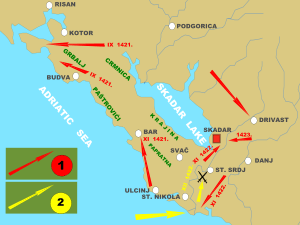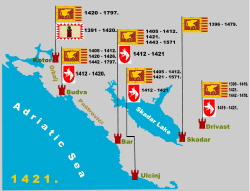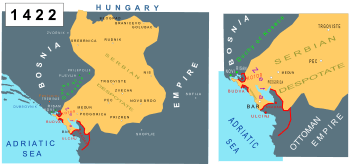Second Scutari War
| Second Scutari War | |||||||||
|---|---|---|---|---|---|---|---|---|---|
 Map of operations in 1421—1423, 1. Forces of Serbian Despotate, 2. Venetian forces | |||||||||
| |||||||||
| Belligerents | |||||||||
|
|
| ||||||||
| Commanders and leaders | |||||||||
| |||||||||
| ||||||
The Second Scutari War (Serbian Cyrillic: Други скадарски рат) was an armed conflict in 1419—1426 between Zeta (1419—1421) and Serbian Despotate (1421—1423) on one side and Venetian Republic on another, over Scutari and other former possessions of Zeta captured by Venice.
Background
The First Scutari War was waged in period 1405—1413 between Balša III and Venetian Republic.[4] In this war Balša III tried to capture Scutari and its surrounding region which was given to Venetians by his father Đurađ II Balšić in 1396. Using the anti-Venetian rebellion of the Scutari population Balša III managed to capture several nearby towns in 1405. Venetians then convinced Balša's towns Budva, Bar and Ulcinj to accept their suzerainty. After several years of battles and negotiations the war was ended in 1412 with treaty which obliged Balša III and Venice to return everything to pre-war situation. Both parties were unsatisfied with the peace treaty and believed that the other party was in breach of the agreed terms and that the other party should pay more for the damage during the war.
War
Between Zeta and Venice
In March 1419 Balša III again attempted to recapture Scutari and its surrounding area. In May he managed to capture Drivast and in August 1419 its castle. The Venetians tried to bribe Kastriotis and Dukagjinis to fight against Zeta in 1419, but it seems without success.[5] Venetians also tried to win over some other prominent members of Albanian nobility who supported Balša III, like Koja Zaharia who was asked to recognize Venetian suzerainty over his Dagnum. Then they tried to win over tribes Hoti and Mataguži.[6]
Between Serbian Despotate and Venice

Capture of Drivast, Sveti Srđ and Bar
Lazarević and his Serbian Despotate had been ceded Lordship of Zeta from Balša III in April 1421, but the Venetians did not recognize him, holding on to the occupied Zetan coast and Bojana, including Drivast recaptured by them after Balša's death.[7] Venetians emphasized to despot's envoy that they have no intention to cede Balša's former possessions to despot and even requested Ottoman support in case of despot's attack.[8] In August 1421, Lazarević led his army into Zeta. Gjon Kastrioti, who was a Serbian ally,[9] reinforced Lazarević with troops led by one of his sons immediately upon the arrival of the latter in Zeta.[10][11] According to Fan Noli it was Stanisha who was sent by his father, together with auxiliary forces, to help Serbian despot to capture Scutari from Venetians.[12] With their support despot immediately captured Sveti Srdj and Drivast. Then he went to the coast and took Bar in middle of November 1421.
Lazarević appointed voivode Mazarek to administer his possessions in Zeta.[13] Until then Mazarek administered despot's possessions in Rudnik (1414)[14] and Ostrovica.[15] Noblemen from Bar were then invited to a meeting in cathedral of St. George where they recognized the suzerainty of Serbian despot while Mazarek recognized their right to govern the city according to their own legislations.[16]

Truce
Lazarević concluded the six-months truce with Venice and left to support king Sigismund in his fight against the Hussites. The truce was agreed to last until 15 May 1422.[17] After despot's initial success Venetians readily accepted the truce. Тhe towns of Scutari, Ulcinj and Budva at that moment remainined under their control.
Venetians used the truce to reinforce the Scutari garrison. They transported soldiers, food and arms to Skadar through river Bojana.[18]
During the truce in the first half of 1422 peace negotiations were held in Venice and attended by despot's envoy duke Vitko. They were continued in Serbia between Venice's envoy Marco Barbadigo and despot himself.[19] When Lazarević demanded the surrender of disputed towns, Venice refused and war resumed.[7]
Battles on Bojana
Despot Stefan did not continue the war immediately after the truce because he was busy with other activities, but his voivode Mazarek undertook actions to prevent Venetian reinforcement of the Scutari garrison.[18] He erected several fortresses on the right bank of river Bojana from where he controlled the river. When Venetian captain Niccolo Capello was sent to transport food supplies and archers to the besieged Scutari using three galleys, Mazarek's forces on Bojana forced his galleys to retreat to the Adriatic sea.[20] In July 1422, the Venetian Senate ordered Niccolo Capello to return to Bojana and complete his mission, but he decided to wait for two galleys of providur and supracomite Marco Bembo and Marco Barbo carrying soldiers and material for destruction of the fortress Mazarek had erected in Sveti Srđ.[21]
Siege of Scutari in 1422
Lazarević's forces besieged Scutari, probably in June 1422, and for a year, it seemed that Venice would have lost their possessions. In November 1422 Venetian fleet destroyed Mazarek's fortresses on Bojana and reached Sveti Srđ. Due to low water level they could not continue their voyage through Bojana.[22]
Supported by some local Albanians, Venice managed to break the siege in December 1422.[23] Scutari garrison led by captain Niccolo Capello unexpectedly attacked despot's army during one December night and broke the siege.[24] After the siege was broken Venetians reinforced Scutari's garrison with additional 400 cavalry and between 200 and 300 infantry.[24]
Siege of Scutari in 1423
Despot's army did not suffer serious casualties and returned under Scutari's fortress in January 1423.[25] In January 1423, Venice bribed and won over the Pamaliots on Bojana, and then bought over several tribal leader in or near Zeta: the Paštrovići, Gjon Kastrioti (who had extended to the outskirts of Alessio), the Dukagjins, and Koja Zaharija.[23] Though none of these were mobilized militarly by Venice, they left the ranks of Lazarević's army, thus became a potential danger to Lazarević.[23] Although Venetian admiral Francesco Bembo offered money to Gjon Kastrioti, Dukagjins and to Koja Zaharija in April 1423 to join the Venetian forces against Serbian Despotate, they refused.[26]
In summer of 1423 despot Lazarević sent Đurađ Branković with 8,000 cavalry to Zeta. He besieged Scutari and erected fortresses on Bojana to cut off Venetian supplies of the besieged city. Duke Sandalj was prepared to support Serbian despot in his attempts to capture Scutari. Faced with such difficult situation Venetian governors were instructed to negotiate peace.
End of war
Treaty of Sveti Srdj
The conflict was ended in August 1423, after conclusion of the treaty (the Peace of Sveti Srdj).[27] In the name of the Serbian Despotate, the treaty was signed by Đurađ Branković (with two witnesses who were Ottoman officials). Branković was the despot's representative in Zeta since 1423 and was also in charge for all negotiations. According to the treaty the Serbian Despotate kept Drivast and Bar while Venice kept Scutari, Ulcinj and Kotor. Venice was obliged to return Budva and Grbalj region to Serbia and to pay 1,000 ducats in annual tribute for Scutari to the Lazarevići, which they initially had paid out to Balša III. Both parties agreed to exchange prisoners and to raze their forts on Bojana which was agreed to be completely in Venetian hands.
After the treaty was signed Francesco Bembo invited Đurađ to a ceremonial reception organized on his ship sailing over Bojana, followed by other ships of the Venetian fleet. Đurađ then asked Venice to support him with six galleys in an eventual war against the Ottomans and to confirm him all privileges previously held by his father Vuk, knez Lazar or despot Stefan.[28]
Treaty of Vučitrn
Although the treaty of Sveti Srdj had been signed there were many issues that remained unresolved. Therefore, the disputes were not fully resolved until the final settlement was achieved by an agreement signed in Vučitrn in 1426. The treaty of Vučitrn was revised in Drivast on 11 November 1426.[29]
Aftermath
Đurađ Branković succeeded Stefan Lazarević after his death in 1427 and lost control over Bar to Venetians.[30]
References
- ↑ Božić 1979, pp. 178, 179
- ↑ M. Bešić, Zarij (1970), Istorija Crne Gore / 2. Crna gora u doba oblasnih gospodara. (in Serbian), Titograd: Redakcija za istoiju Crne Gore, p. 143, OCLC 175122851,
С њим су ратовали такође Која Закаријаи Дукађани — Тануш Велики и Тануш Мали.
- ↑ M. Bešić, Zarij (1970), Istorija Crne Gore / 2. Crna gora u doba oblasnih gospodara. (in Serbian), Titograd: Redakcija za istoiju Crne Gore, p. 145, OCLC 175122851,
Андрији Хумоју, који је за разлику од својих рођака, вјерних поданика Републике, пришао током рата деспоту и кога су Млечани сматрали „одметником".
- ↑ Kotor (Montenegro) Pomorski muzej (1969). Annual of Maritime Museum at Kotor (in Serbian). Kotor. p. 34. Retrieved 29 July 2012.
Prvi skadarski rat protiv Balse III 1405-1412.
- ↑ Fine 1994, p. 515
- ↑ Glas, Том 338. Belgrade: Serbian Academy of Sciences and Arts. 1983. p. 67. Retrieved August 2, 2012.
- 1 2 Fine 1994, p. 516
- ↑ Glas, Том 338. Belgrade: Serbian Academy of Sciences and Arts. 1983. p. 67. Retrieved August 2, 2012.
- ↑ Egro, Dritan (2010), Oliver Jens Schmitt, ed., Religion und Kultur im albanischsprachigen Südosteuropa 4, Frankfurt am Main, Berlin, Bern, Bruxelles, New York, Oxford, Wien, p. 20, ISBN 978-3-631-60295-9,
Gjon Kastrioti... converted to Orthodoxy from 1419-1426, accepting the alliance of Stephen Lazarevic of Serbia ...
- ↑ Ćorović 2001: "Уз Стевана се борило и нешто Арбанаса Ивана Кастриота, који је пришао деспоту одмах по доласку овог у Зету."
- ↑ Vujović, Dimitrije; Risto Dragićević, Nikola Đakonović, Milinko Đurović, Mirčeta Đurović, Pavle Mijović, Đoko Pejović, Vlado Strugar (1970), Milinko Đurović, ed., Istorija Crne Gore [History of Montenegro] (in Serbian) II, Titograd: Naučno Delo, p. 143, OCLC 633018773,
У деспотовој војсци налазили су се и одреди Ивана Кастриота, који је тада имао посједе око Љеша, и то под командом једног од његових синова....
Cite uses deprecated parameter|coauthors=(help) - ↑ Noli, Fan Stilian (1947), George Castrioti Scanderbeg (1405–1468), International Universities Press, OCLC 732882,
As a matter of fact, he had sent his son Stanisha with an auxiliary corps to help the Serbians against the Venetians at Scutari
- ↑ Božić 1979, pp. 178, 179
Деспот Стефан Лазаревић, када је августа 1421 дошао у Зету, није се тамо дуго задржао. Управу над поседнутим крајевима и градовима поверио је војводи Мазареку, Арбанасу који је већ одавно био у његовој служби. ... Мазарек је био и командант деспотових снага које су у позну јесен 1422 опседале Скадар и водиле борбе у Бојани.
- ↑ Društvo za nauku i umjetnost Crne Gore. Odjeljenje društvenih nauka, Društvo za nauku i umjetnost Crne Gore (1975). Odjeljenje društvenih nauka. Društvo za nauku i umjetnost Crne Gore. p. 8.
- ↑ Bešić, Zarij M (1970). Istorija Črne Gore. Red. za istoriju Črne Gore. p. 139. Retrieved August 2, 2012.
- ↑ Božić 1979, p. 178
Чим је стигао у тек освојени Бар, сазвао је градску властелу у цркву Св. Ђорђа. Ту је властела, као представник „општине" града Бара, при- знала власт српског деспота. А Мазарек је, као деспотов опуномоћеник, признао барској властели старо право да управља градом и да суди по својим статутима.
- ↑ Srejović, Dragoslav; Slavko Gavrilović; Sima M. Ćirković (1982). Istorija srpskog naroda: knj. Od najstarijih vremena do Maričke bitke (1371) (in Serbian). Srpska književna zadruga. p. 199.
- 1 2 Srejović, Dragoslav; Slavko Gavrilović; Sima M. Ćirković (1982). Istorija srpskog naroda: knj. Od najstarijih vremena do Maričke bitke (1371) (in Serbian). Srpska književna zadruga. p. 199. Retrieved 4 August 2012.
- ↑ Maletić, Mihailo (1976). Crna Gora (in Serbian). Književne novine. p. 162. Retrieved 1 August 2012.
У првој половини 1422. водио је преговоре у Венецији деспотов војвода Витко. Наставио их је Млечанин Марко Барбадиго код деспота, али
- ↑ Godisnjak Pomorskog muzeja u Kotoru. Kotor: Pomorski muzej u Kotoru. 1968. p. 36. Retrieved 3 August 2012.
- ↑ Božić 1979, p. 222
- ↑ Godisnjak Pomorskog muzeja u Kotoru. Kotor: Pomorski muzej u Kotoru. 1968. p. 37. Retrieved 3 August 2012.
- 1 2 3 Fine 1994, p. 517
- 1 2 Purković, Miodrag Al (1978). Knez i despot Stefan Lazarević (in Serbian). Sveti arhijerejski sinod Srpske pravoslavne crkve. p. 123. Retrieved 3 August 2012.
- ↑ Božić 1979, p. 179
- ↑ Vujović, Dimitrije; Risto Dragićević, Nikola Đakonović, Milinko Đurović, Mirčeta Đurović, Pavle Mijović, Đoko Pejović, Vlado Strugar (1970), Milinko Đurović, ed., Istorija Crne Gore [History of Montenegro] (in Serbian) II, Titograd: Naučno Delo, p. 144, OCLC 633018773,
Франћеско Бембо је настојао да привучена млетачку страну најистакнутије арбанаске господаре. Ивану Кастриоту је нудио 300, Који Закарији 200, а двојици Дукађина по сто дуката....Ни он ту није ништа учинио...
Cite uses deprecated parameter|coauthors=(help) - ↑ Fine, John Van Antwerp (1994), The Late Medieval Balkans: A Critical Survey from the Late Twelfth Century to the Ottoman Conquest, University of Michigan Press, p. 519, ISBN 978-0-472-08260-5
- ↑ Srejović, Dragoslav; Slavko Gavrilović, Sima M. Ćirković (1982), Istorija srpskog naroda: knj. Od najstarijih vremena do Maričke bitke (1371), p. 201 Cite uses deprecated parameter
|coauthors=(help) - ↑ Spremić, Momčilo (1964). Zbornik Filozofskog fakulteta. Naučno delo. p. 197. Retrieved 6 January 2014.
Када је поменути споразум допуњаван и редигован 11. новембра исте године у Дривасту...
- ↑ Katanić, Nadežda (1961). Građa za proučavanje starih kamenih mostova i akvedukata u Srbiji, Makedoniji i Crnoj Gori. Savezni institut za zaštitu spomenika kulture. p. 298.
Sources
- Božić, Ivan (1979). Nemirno pomorje XV veka (in Serbian). Belgrade: Srpska književna zadruga. OCLC 5845972. Retrieved 12 February 2012.
- Van Antwerp Fine, John (1987), The Late Medieval Balkans: A Critical Survey from the Late Twelfth Century, University of Michigan Press, ISBN 978-0-472-10079-8
Further reading
- Dabinović, Antun (1937), Kotor u drugom skadarskom ratu : 1419-1423 (in Croatian), Zagreb: Jugoslavenska akademija znanosti i umjetnosti, OCLC 774252729